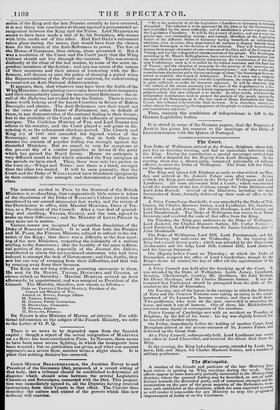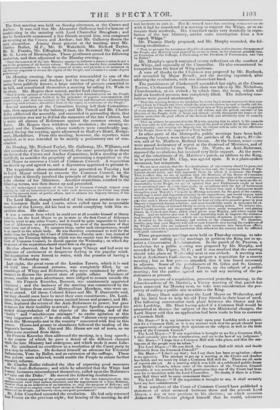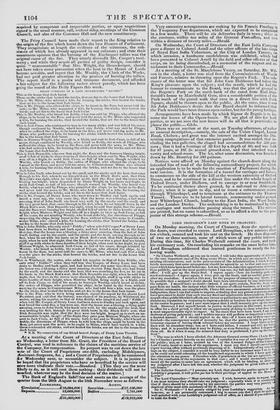et e ilistrapnIkt.
A number of the friends and partisans of the late Ministry have been active in getting up Whig meetings during the week. Their efforts appear to have been only partially successful in the Metropolitan districts, where the general feeling may be described, as one of indif- ference towards the discarded party, and of conscious strength and de- termination on the part of the great majority of the Reformers, to re- turn such candidates at the elections, which are soon expected to occur, as will render it impossible for any Ministry to stop the progress of improvement at home or on the Continent. • The first meeting was held on Sunday afternoon, at the Crown and Anchor. It was said that Mr. Alexander Galloway had the honour of breakfasting in the morning with Lord Chancellor Brougham ; and that he forthwith summoned a few friends around him, who composed the meeting at the Crown and Anchor ; but Mr. Galloway denies the story altogether. Among those present at the meeting, were Mr. Charles Buller, M.P., Mr. D. Wakefield, Mr. Richard Taylor, Mr. R. Franks, Mr. Effingham Wilson, the Reverend Mr. Fox, and gr. G. Lewis of Birmingham. These gentlemen passed the following resolution, and then adjourned to the Monday evening- - That the removal of the late Ministry appears to indicate a detem.iration to put a stop to the progress of all further reform. We therefore do hereby form ourselves into a permanent committee, to watch the course of events, and promote such measures as say become requisite to secure the rights of the People, and advance tie cause of good government:.
On Monday evening, the same parties reassembled in one of the
rooms of the Crown and Anchor; but the meeting of the Committee having been publicly known, a large number of persons assembled in the hall, and constituted themselves a meeting by calling Dr. Wade to the chair. Mr. Rogers then moved, amidst loud cheering— s That it is the opinion of this meeting, that the beet Administration for the People is that which will advance furthest in the principles of popular representation and retrenchment ; and that the conduct of the Melbourne and Brougham Administration i3 opposing such advance, disentitles them to the regret or confidence of the People." Several members of the Committee having left their Committee- room, then appeared in the balcony ; and Mr. Powell and Mr. Charles Buller addressed the assembly, and succeeded in persuading them, that their intention was not to defend the measures of the late Cabinet, but to unite all classes of Reformers against the common enemy, the Tories. Mr. Rogers then withdrew his resolution ; the meeting se- parated, and the Committee, whose numbers were considerably aug- mented during the evening, again adjourned to Radley's Hotel, Bridge- street, Blackfriars. From this meeting, however, the reporters were deluded, as it was intended to be merely a preliminary one of con- sultation.
On Monday, Mr. Richard Taylor, Mr. Galloway, Mr. Williams, and other members of the Common Council, the same principally as those who formed the Crown and Anchor Committee, held a meeting at the Guildhall, to consider the propriety of presenting a requisition to the Lord Mayor to convene a Court of Common Council. A requisition was drawn up and agreed to, and a deputation appointed to present it.
The requisition above-mentioned was presented on Tuesday ; but the Lord Mayor refused to convene the Common Council, on the ground that it directly involved the principle of dictating to the King in the choice of his Ministers. Another requisition, couched in the following terms, was then drawn up and presented.
We, the undersigned members of the Court of Common Council, request your Lordship to call an immediate Court to take such measures as the Court may think !Wain the present state of public affairs, and to address his Majesty thereon, if tho Court shall think at.
The Lord Mayor, though reminded of his solemn promise to con- vene Common Halls and Courts, when called upon by respectable members of the Livery, did his best to avoid complying with this re- quisition also. He said— It was a custom from which he could not at all consider himself at liberty to deviate, for the Lord Mayor to go in state to the first Court of Aldermen before he went to any other Court ; and it would be quite impossible to hold a Court of Aldermen at a moment's warning, for most of the members of that Court were out of town. To summon them, under such circumstances, would be an insult to the whole body. He was therefore constrained to wait for the regular time for holding the Court of Aldermen—Tuesday next : but, instead of appointing the Thursday following, which was the regular time for holding the Court of Common Council, he should appoint the Wednesday; on which day the matter of the requisition should stand first on the paper.
He also observed, that he had been upon 'Change and had seen no symptoms of excitement or dangerous feeling in the popular mind. The deputation were forced to retire, with the promise of having a Court on Wednesday next.
Last night, the great room of the London Tavern, which it is said sill hold two thousand persons, was completely filled, by an assemblage of Whigs and Reformers, who were summoned by adver- tisement to discuss the present state of public affairs. Numbers of persons, unable to gain admittance, were obliged to remain outside the room. Sir Francis Knowles, Baronet, was unanimously appointed Chairman' and the business of the meeting was commenced by the reading of letters from several Metropolitan Members, who were un. able to attend. Of these, Colonel Evans and Mr. T. Duncombe said, that they should soon have to meet their own constituents ; Dr. Lush- Uleton (the mention of whose name excited hisses and groans), and Mr. Grote, deplored the return of the Anti-Reformers to power, but gave no reason for their inability to attend ; Sergeant Spankie expressed his decided disapprobation of the objects of the meeting, and of the "feeble " and "mischievous attempts " to excite agitation at this "very important crisis :" he also said, that "almost every respectable nun in the Metropolis and in the country" concurred with him in this opinion. Hisses and groans in abundance followed the reading of the Sergeant's lecture. Mr. Clay and Mr. Hume are out of town, so no *plies were received from them.
Sir Francis Knowles then addressed the meeting, in a long speech ; is the course of which he gave a detail of the different changes which the late Ministry had undergone, and which made it more Libe- ral. He attributed its overthrow to a resolution of the Court party to Put a stop to reforms. He declared himself an advocate for Triennial Parliaments, Vote by Ballot, and an extension of the suffrage. These
three points once achieved, would enable the People to obtain further necessary- reforms.
from Charles Buller ridiculed the idea of expecting good measures irom the Anti. Reformers; and while he admitted that the Whigs had io many instances misconducted themselves, called upon the Reformers lo" turn out the Duke." He moved the following resolution— `That, without approving of the general conduct of the late Administration, this 1.1"tiazcannot view their sudden dismissal, and the appointment of a Tory Ministry, veretse than as an indication of an intention to stop the progress of Reform; and Am, are resolved to employ every legal means in their power to secure the rights and eraestsof the People, and thereby cheap and good government." Mr. John Crawford seconded the resolution. He had only returned from France on the previous night; but hearing of the meeting, he did not hesitate to join it. But h_ wou:d have hau nothitig whaLever to do with it had he considered it a meeting to support the Whigs, or to ex- tenuate their misdeeds. Mr. Crawford spoke very decidedly in repro. bation of the late Ministry, amidst some interruption from a few " stanch Whigs."
Mr. Thomas Hardy proposed, and Mr. Murphy seconded, the fol- lowing resolution-
" That, to present the recurrence of peli t heal convulsion, and to deserve the support of the People. any Ministry must proceed to secure to them, in the shortest possible time, an Extension of the Suffrage, a Shorteniug of the Duration of Parliaments, and Vats by Ballot."
Mr. Murphy's speech contained severe reflections on the conduct of the Whigs, and especially of the Chancellor. He also encountered in- terruption from the knot of Whig partisans.
A vote of thanks to the Chairman was proposed by Mr. Roebuck, and seconded by Major Revell ; and the meeting separated, after adopting the resolutions, with one dissentient hand.
The parishioners of Clerkenwell assembled last night, at the Crown Tavern, Clerkenwell Green. The chair was taken by Mr. Nicholson, Churchwarden, at six o'clock ; by which time, the room, which will hold six hundred persons, was completely filled. The following reso- lutions were passed unanimously.
" That this meeting declares its intention by every legal means to promote that com- plete reform in Church and State which the numerous abuses in each so loudly call for. " That the return to his Majesty's councils of men of Tory principles—the supporters of every abuse, the constant opponents of all reform, and the proved enemies of the liberties of the People. both at home and abroad—would disappoint the hopes of the nation. neutralize the good effects of the Reform Bill, and ultimately lead to anarchy and confusion.
" That an address be presented to his Majesty, praying him to admit to his councils such men only as will carry to its utmost extent the good of which the Reform Bill was the beginning; and ,tssuring his Majesty that his throne will be safer in the affections of his People, than in the support of a Tory faction."
In other parts of the Metropolis, public meetings have been held. Among the largest, were those of the parishes of St. Luke's, sex, and of St. Matthew, Bethnal Green. At the former, resottaions were passed declaratory of regret at the dismissal of Ministers, and of determined hostility to the Tories. Mr. Watts, an Anti-Reformer, opposed the resolutions, but received very little support. At the meet- ing of the inhabitants of St. Matthew's parish, an address to the King, to be presented by Mr. Clay, was agreed upon. It is a plain-spoken document, but temperate.
" We are most anxious that the free institutions of our eonntry should be preserved unimpaired. and gradually improved. That to this end, the Commons House of Par- liament should freely and fully represent those by whom it is chosen—the People. That to effect this, we are of opinion that the Members of the Douse of Commons should be elected by household suffrage. That to preserve the votes of the constituency free and unbiassed, they should be protected, by secret ballot. That to increase the ac- countability to the People, we arc of opiniou that new Parliaments ought at least to be summoned once in every three years, in accordance with the Act of Settlement passed in the 12th and 131is William III. We believe that such a Parliament would strengthen your Majesty's Councils in effecting measures for the good of the country. would urge a strict and impartial economy in the expenditure, and would impose taxes with the least possible injury to the feelings and interests of the People. NVe believe also that such a House of Commons would be best ca'culated to preserve peace in your Majesty's important foreign relations, and most beneficially assist in measures for ex- tending the blessings of national liberty to every surrounding nation. We believe also, that it would speedily and unsparingly extirpate those many recognized and glaring abuses in Church and State, which must grieve your Majesty, and which injure the People. And we believe also that it would materially tend to improve the aristocra- tical branch of the Legislature ; which we are humbly of opinion, m its present state. is ill-suited to the wants, interests, and wishes of the community. We therefore, humbly pray that your Majesty will call to your Councils men having the confidence of the People, anal who are prepared to carry such measures into immediate effect; being impressed with a serious conviction that otherwise the country will be afflicted with great calamities."
Three preparatory meetings were held on Thursday evening, to take measures for calling pi.!;!:e meetings to petition the King not to ap- point a Conservative A.1 winistration. In the parish of St. Pancras, a resolution for a public ineeting was proposed by Mr. Murphy, and seconded by Mr. Vigors, M. P. ; and it was resolved that the meeting should take place on Wednesday next at one o'clock. A meeting was held at Anderton's Coffeehouse, to prepare a requisition for a county meeting; but so few pers- ;its attended, that it was found necessary to adjourn. Some of the parishioners of St. Giles and St. George, Bloomsbury, met at the Angel Tavern, on the subject of a public meeting ; but the parties agreed not to call any meeting of the pa- rishioners at present.
In consequence of a requisition, presented yesterday morning, to the Churchwardens of St. Martin's, a Vestry meeting of that parish has been convened for Monday next, to take into consideration the pro- priety of calling a public one to address the King.
Mr. Henry Hunt waited upon the Lord Mayor on Wednesday, and did his little best to help his old Tory friends in their hour of need. The following conversation took place between the Orator and his civic Lordship. Mr. Hunt having asked if a Common Hall would be assembled to discuss the subject of the late Ministerial changes, the Lord Mayor said that no application had been made to him to convene a Common Hall.
Mr. Hunt—" It is my intention to wait upon your Lordship with a requisi- tion for a Common Hall, as it is my anxious wish that than people should have an opportunity of expressing their opinions on the subject, as well as the little junta of the Common Council." The Lord Mayor—" If any requisition is brought to me for a Common Hall, I shall certainly give it due consideration, and act to the best of my judgment." Air. Hunt—" I hope that a Common Hall will take place, and that the sen- timents of the people may be taken." The Lord Mayor—" Do you think the Common Hall will think and decide differently front the Common Council?" Mr. Hunt—" I don't say that ; but I say there has been no agitation--there is no agitation. The attempt to get up a meeting at the Crown and Anchor has failed, and we must try what a Common Hall will do. There are all sorts of reports abroad. At a meeting which was held at a celebrated public-house near Bride's Church, where some of the mends:is of the Common Council assemble, it was asserted by an Irish gentleman that one of the Court had been sent for to breakfast with the Lord Chancellor. No doubt, if there is a Com- mon Hall there will be some amusement there."
The Lord Mayor—" If the requisition is brought to me, it shall certainly have my best consideration."
N,ne members of the Court of Common Council have published a statement of what occurred between them and the present Lord Mayor, a day or two previous to his election ; on which occasion Alderman Winchester pledged himself that be would, whenever
severed by competent and respectable parties, or upon requisitions aimed in the usual manner, call, without delay, meetings of the Common Caraca, and also of the Common Hall and the new constituency.
-•






















 Previous page
Previous page